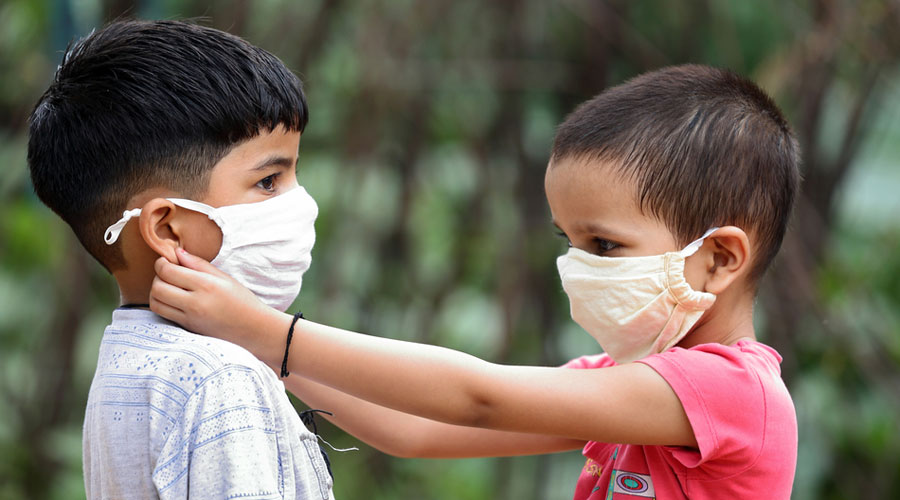
'Hurried reopening of schools not advisable' -Kids can carry higher Covid loads than adults - Presence of the virus does not correlate with symptoms: Study
 G.S. Mudur | TT | New Delhi | 21.08.20 : Children may serve as silent carriers of the new coronavirus infection, showing no symptoms but possessing viral loads even higher than adults hospitalised with severe coronavirus disease, new research released on Thursday has suggested.
G.S. Mudur | TT | New Delhi | 21.08.20 : Children may serve as silent carriers of the new coronavirus infection, showing no symptoms but possessing viral loads even higher than adults hospitalised with severe coronavirus disease, new research released on Thursday has suggested.The study by doctors at the Massachusetts General Hospital in the US has revealed that children may be a potential source of the infection, capable of spreading the virus that causes Covid-19 even though they may have mild or no symptoms.
The study, published in the Journal of Paediatrics on Thursday, has shown for the first time that the viral loads in children without symptoms can exceed those in hospitalised patients and challenged current ideas about Covid-19 in children.
“We find that in children, the presence of the virus does not correlate with symptoms,” Alessio Fasano, professor of paediatrics at the Harvard Medical School and MGH who led the study, told The Telegraph via email.
Fasano and his colleagues also found that only around half of the infected children they examined had fever — the vast majority of the children had no symptoms or only mild symptoms such as a runny nose, cough or low fever.
The researchers said their findings imply that in school settings, scans for body temperatures and the search for symptoms such as fever would not be reliable methods to identify children who might be infected.
“Fever and symptoms will not identify children infected with Covid-19,” Lael Yonker, a paediatric pulmonologist at MGH and first author of the study, told this newspaper via email. “Therefore, all children should follow strict precautions — wear masks, follow physical distancing, practise good hand hygiene and consider remote learning.”
The researchers caution that hurried reopening of schools without adequate planning could result in a rise in infections. “If schools were to reopen fully without necessary precautions, it is likely that children will play a larger role in this pandemic,” Fasano said.
Their study, described as the most comprehensive on Covid-related paediatric patients yet, looked at 192 children from infancy up to the age of 22. Of them, 49 tested positive for SARS-CoV-2, the virus that causes Covid-19, and 18 other children with Covid-19-related illness.
They found the viral loads measured through concentrations of SARS-CoV-2 in nasal and throat swabs in asymptomatic children or in the early phases of infection were significantly higher than in hospitalised adults with over seven days of symptoms. Some paediatric patients showed no difference in viral loads compared with even some adults who required ventilator support because of serious disease.
The findings have surprised researchers. “We also found that age does not affect viral load in respiratory secretions,” Yonker said. “Young children or infants can carry as high a viral load as older children,” she said.
Their study has also challenged the current hypothesis that children are less likely to become infected or seriously ill because they have fewer numbers of ACE receptors or the molecular gateways that SARS-CoV-2 uses to enter human cells.
The researchers found that although younger children have lower numbers of the virus receptor than older children or adults, this fewer number does not mean lower viral loads. This finding suggests that children even with fewer virus receptors can carry high viral loads and thus be contagious, the researchers said.

0 Response to "'Hurried reopening of schools not advisable' -Kids can carry higher Covid loads than adults - Presence of the virus does not correlate with symptoms: Study"
Post a Comment
Disclaimer Note:
The views expressed in the articles published here are solely those of the author and do not necessarily reflect the official policy, position, or perspective of Kalimpong News or KalimNews. Kalimpong News and KalimNews disclaim all liability for the published or posted articles, news, and information and assume no responsibility for the accuracy or validity of the content.
Kalimpong News is a non-profit online news platform managed by KalimNews and operated under the Kalimpong Press Club.
Comment Policy:
We encourage respectful and constructive discussions. Please ensure decency while commenting and register with your email ID to participate.
Note: only a member of this blog may post a comment.